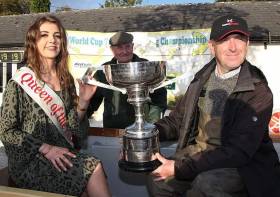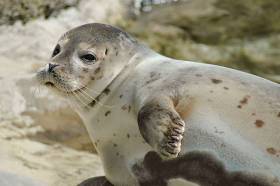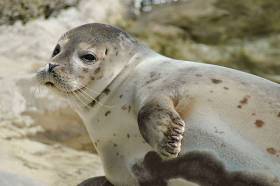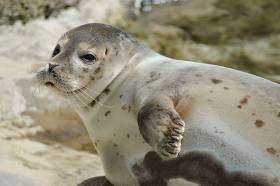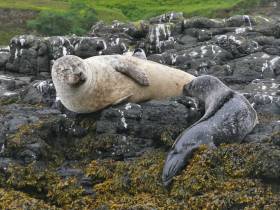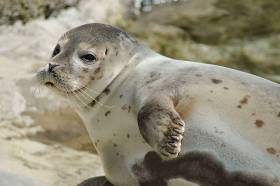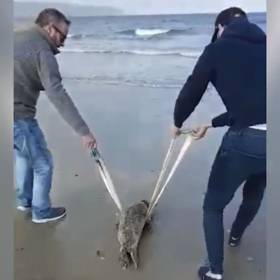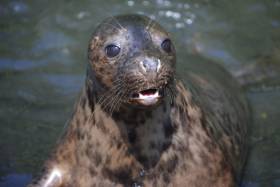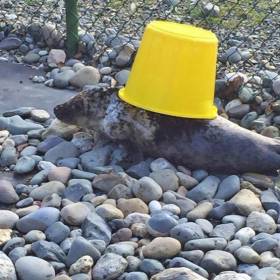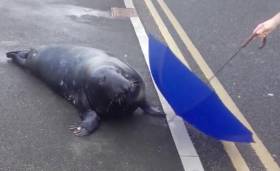Displaying items by tag: seals
Fly World Cup Goes To Leitrim Angler After Month-Long Championship
Leitrim angler Bernard Kilkenny claimed the World Cup in trout fly angling on Lough Mask last weekend, as Derek Evans notes in today’s Irish Times.
His five trout at 5.73lb secured the title — as well as a boat with 15HP outboard, and a new rod and reel — in what was “the most drawn-out in the 63 years of the championships”, with poor weather meaning three attempts over a whole month were required.
Elsewhere, two anglers caused a headache for marine wildlife lovers in Wicklow yesterday (Sunday 8 September) when they were spotted fishing just meters from a protected seal colony.
According to Wicklow News, the men had ignored signs warning away from the seals, as well as the pleas of several onlookers, but left the area after they were spoken to by gardaí.
It is recommended that the public stay at least 100 metres away from seals as they enter their breeding season and seek safe space on land from September to the end of the year.
Training For Achill Islanders In Seal Rescue Protocol
#MarineWildlife - Islanders’ attempts to rescue a seal pup stranded on Achill in Co Mayo recently were sadly not successful.
But the incident has galvanised a local group set up amid growing concerns over marine wildlife strandings, who will train with a team from Seal Rescue Ireland in January on potential lifesaving measures, as the Mayo News reports.
“We’re getting these trainers down just so people know what to do in these situations,” said Achill resident Sorsha Kennedy. “It’s okay for them to be on the shore, they may just be resting, but people don’t know that.”
Kennedy was part of a group that attempted to rescue a baby seal washed up on rocks at Keel Beach in late November.
The pup unfortunately died in transit to Seal Rescue Ireland’s base across the country in Courtown.
“It’s a terribly long stressful journey for an animal already in distress,“ said John Nikolai, who discovered the seal while walking his dog. “It’s such a pity there isn’t another sanctuary closer in the west.”
The Mayo News has more on the story, while Afloat.ie reported recently on other seal rescue efforts around the Irish coast.
Seals Released Off North Coast After Extended Exploris Stay
#MarineWildlife - Two common seals were released off the North Coast last week after being nursed back to health at the Exploris aquarium in Portaferry.
According to The Irish News, the seals named Hans and Albert had been with the sanctuary since the summer, when they arrived with various injuries.
However, by September both had put on weight and were eating by themselves, prompting Exploris staff to plan for their eventual release at Ballintoy Harbour last Wednesday (29 November).
In a techy twist, Hans and Albert have been microchipped so their progress can be monitored from shore over the next few weeks and months.
Also in the care of Exploris staff is a baby seal rescued from a rocky outcrop off Bangor in Belfast Lough in late October.
BBC News has video of the tiny white seal pup, which was suspected to have an injured hip and damaged flipper likely suffered during Storm Ophelia.
Another presumed victim of the stormy weather was a seal recovered from Dun Laoghaire’s East Pier on Hallowe’en.
The Irish Times reports that the marine mammal had sustained injuries to its face and rear flipper, but was said to be doing well in the care of volunteers from the Courtown Seal Rescue Centre in Co Wexford.
More recently, a number of stranded dolphins were successfully returned to the water off Achill Island by locals and volunteers on Tuesday 21 November.
Four common dolphins were reflected from Keem Beach, though a fifth was found dead on nearby rocks. The Irish Whale and Dolphin Group (IWDG) removed the carcass to determine its cause of death, as the Mayo News reports.
Back on the North Coast, BelfastLive says a six-metre whale carcass surprised locals at Runkerry Strand near Portballintrae on 24 November.
The find came just weeks after a much larger fin whale carcass was found on Arranmore off the Donegal coast, as previously reported on Afloat.ie.
Seal Rescue Centre Seeks Sponsors
#MarineWildlife - The Seal Rescue Centre in Courtown is appealing for new sponsors to fund supplies for the marine wildlife in its care, as the Gorey Guardian reports.
The sanctuary recently took on its first sponsor in Gorey’s Amber Springs Hotel, which now has its name displayed over one of the 12 kennels available.
More than 60 seals are being kept at the Co Wexford centre that has a busy winter period taking in rescued seals and seal pups, the latest of them brought in from Clogherhead in Co Louth at the end of January.
But the Seal Rescue Centre is also celebrating successful releases back into the wild of seals it has treated — like Nala, an orphaned seal found in distress at Union Hall in West Cork last October, according to the Southern Star.
Irish Seals Are Cannibals? Research Shows Possible Link To Death Numbers
#MarineWildlife - Is cannibalism among seals to blame for deaths of the marine mammals recorded on Ireland’s shores?
That’s one reason suggested by researchers in the latest report from the Irish Seal Sanctuary’s seal death database, according to the Irish Examiner.
While further research is required, recent studies at UCD indicate that some injuries previously attributed to boat propellers may be consistent with attacks on younger seals by older bulls.
Fishing activity is also suspected in some of the more than 100 carcasses recorded in the two years before May 2016 — particularly over the winter months in Waterford and Wexford, though there is no confirmed connection to the concurrent inshore fishery.
The sanctuary’s database relies on public contributions, with the largest number of seal carcasses reported in Dublin, followed by Cork, Wexford and Waterford.
In related news, the Dublin InQuirer reports on the uneasy relationship between dog walkers on Bull Island and the reserve’s resident seal colonies, which conservationists argue are often disturbed by pets running loose.
Seal Pup Treated For Suspected Stab Wounds
#MarineWildlife - The Wicklow People reports that a six-week-old common seal is being treated for suspected stab wounds after being found in “very shape” by people walking on Arklow’s South Beach yesterday morning (Friday 18 November).
The incident is the second in three weeks in the Arklow area to involve a seal with wounds thought to have been caused by human hands. More on this story HERE.
Beachgoers Rescue Seal Pup From Co Down Strand
#MarineWildlife - Independent.ie has video of a seal pup being rescued by quick-thinking beachgoers in Co Down this week.
Aaron McLoughlin realised he had no phone signal to call for assistance when he and his wife Gemma and her family found the young seal stranded on the sand.
So he and his father-in-law David Lamont improvised a sling to lift the juvenile marine mammal out of danger and back into the water, as you can see in the clip below:
'Poison Ivy' Returns To The Wild At Salthill Beach
#MarineWildlife - Months after she was found on the streets of Galway, the seal pup named Poison Ivy has returned to the sea at Galway Bay with a group of fellow rescued seals.
As previously reported on Afloat.ie, Ivy was no more than three weeks old when she was picked up by council workers on a Salthill footpath last December.
Though seriously ill, she fought her way back to health under the watchful eye of the staff at Seal Rescue Ireland in Wexford, who gave her a name in keeping with their comic-book theme.
But it was back to Salthill she went this past weekend when Ivy was released into the wild at Ladies Beach, according to Galway Bay FM.
Seal Pup 'Poison Ivy' Fighting Fit For Return To The Wild
#MarineWildlife - A seriously ill seal pup found on the streets of Galway last December is just weeks away from release back into the wild.
As previously reported on Afloat.ie, the tiny seal no more than three weeks old was found by Galway City Council workers on a footpath in Salthill.
After emergency care by local vets and wildlife volunteers, the pup was moved to the Seal Rescue Ireland sanctuary in Wexford, whose staff kept with their comic-book theme by naming her Poison Ivy.
It was touch and go for the little one in the weeks and months that followed, though as The Dodo reports, Poison Ivy is now all grown up and fighting fit, enjoying the company of the marine wildlife sanctuary's other young seals.
But it's bath time that the little attention seeker lives for, as this video shows.
The Dodo has much more on the story HERE.
Sammy The Seal Has Fishmongers Flustered
#MarineWildlife - A hungry seal with a taste for only the finest seafood has been filmed up to his old tricks again in Wicklow town.
Earlier this month UPI reported on the antics of Sammy the seal, who's grown notorious for his habit of flopping across the road from the River Vartry to beg for scraps from a local fishmonger.
In his latest appearance, Broadsheet.ie reader Kevin O'Farrell videoed the flustered staff of The Fishman trying to halt Sammy from crossing what can be a busy road before throwing him his meal – one of three every day at high tide.
And as the onlooker adds, it's only been getting worse since a new lady seal came into Sammy's life, promoting the juvenile grey seal to show off his remarkable skills of persuasion.
Here's more on Sammy and his fishmonger friends in Wicklow from RTÉ News Now:



























